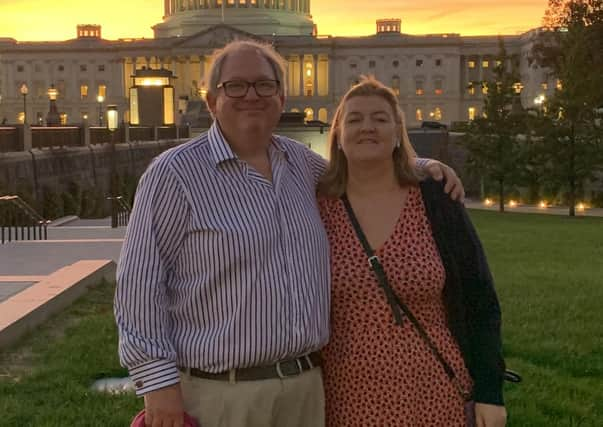Glasgow doctor turned patient warns public not to ignore urgent health concerns


Paul Trafford (63) is an anaesthetist who works out of Nuffield Hospital in Glasgow. Last week Paul returned home and began to feel unwell, registering abnormally high blood pressure on his home testing kit.
However, not wanting to “burden” the NHS, it was only after persuasion from his wife Julie Doughty, who works as a breast cancer surgeon, that Paul made the decision to go to A&E at the Queen Elizabeth University Hospital.
Advertisement
Hide AdAdvertisement
Hide AdIt was lucky he did. After being checked for COVID-19 symptoms at the door, Paul swiftly received an electrocardiogram (ECG) from the A&E staff at QEUH which revealed a potentially life threatening abnormality in his heart.
Paul was then blue-lighted to the Golden Jubilee where he immediately underwent life-saving surgery to have a stent inserted to widen one of his arteries, which had narrowed.
The whole process from arriving at A&E at 6.30pm to being discharged to the ward was all over in three hours, and potentially saved Paul’s life.
Paul said: “NHSGGC is definitely open for business. I was anxious about placing any additional pressure on the emergency department during this time, but I didn’t quite realise just how well prepared the board is when it comes to urgent treatment for non-COVID-19 patients.
Advertisement
Hide AdAdvertisement
Hide Ad“I was fully ready to go to bed and rest before my wife intervened, and with hindsight I realise how much a bad decision that could have been.
“The care I received at QEUH and the Jubilee was second to none, and I’d like to thank everyone at the health service for their swift and professional action which may have saved my life.
“My advice to the public is definitely seek medical attention if you’re worried about symptoms. The capacity is there and the pathways are in place to ensure you’re seen to and cared for appropriately.”
NHSGGC has noted a wider decrease in the number of people seeking urgent non-COVID-19 medical attention at Emergency Departments and Minor Injury Units, which may due to anxiety around COVID-19 causing less people to seek medical attention.
Advertisement
Hide AdAdvertisement
Hide AdThat’s similarly reflected by a marked reduction the number of Urgent Suspicion of Cancer (USOC) referrals across Greater Glasgow and Clyde.
However, as part of contingency planning, capacity has been maintained within the health service and the appropriate patient pathways have been developed to ensure business continuity for all urgent care requirements in both primary care and acute settings across Greater Glasgow and Clyde.
Any patient requiring urgent hospital care will be safely assessed and cared for through Emergency Departments and (MIUs), and people should contact their GP as normal to discuss any non-COVID-19 health concerns so they can be referred on for further assessment as early as possible.
Dr Scott Davidson, Deputy Medical Director for Acute at NHSGGC, said: “We understand the COVID-19 pandemic may have made people anxious about accessing healthcare services in the same manner they would previously have done. However, we cannot stress enough that capacity for urgent care remains in place.
Advertisement
Hide AdAdvertisement
Hide Ad“It’s crucial that if people have symptoms that are of significant concern and may reflect an underlying serious illness such as cancer, that they are assessed as quickly as is possible.
“While the method of delivery may have changed, across acute, we are working closely with primary care colleagues to ensure patients are managed appropriately and efficiently as normal.
“Any changes to service have made, as always, are underpinned by person centred care, and patient safety and wellbeing are our utmost priorities. The sooner you are able to be assessed, the sooner we can put you on the appropriate care pathway.”
Comment Guidelines
National World encourages reader discussion on our stories. User feedback, insights and back-and-forth exchanges add a rich layer of context to reporting. Please review our Community Guidelines before commenting.